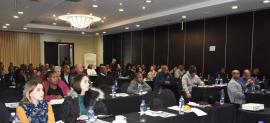
Transformation must take place via opportunities being made available, and not by dismissal or retrenchment of any group, stakeholders in the labour sector say.
This is the message that resonated during a joint workshop with the Department of Employment and Labour and Commission for Conciliation Mediation and Arbitration (CCMA) on the recent amendments to the Employment Equity (EE) Act and setting of EE targets.
The workshop was held in Rustenburg, North West, on Wednesday.
Employment and Labour Deputy Director of Employment Equity, Niresh Singh, said in implementing employment equity and affirmative action, race alone should not be a qualification, but competence and ability should take priority.
“Since 1998 when the EE Act was introduced, we are still found wanting when it comes to equity implementation. We need more African and coloured-owned businesses in place.
“Government needs to put programmes in place. We need to be aggressive, go a step further by empowering women-owned businesses and those owned by people with disabilities,” Singh said.
Singh was addressing the workshop held under the theme, 'Real transformation makes business sense'.
The department and CCMA are currently conducting the 2023 EE roadshows in the form of national workshops.
The focus of this year's workshops is to create awareness on the recently promulgated EE amendments, sector targets and regulations.
Singh said the country’s laws in the main are about inclusivity, and acknowledged that there may be “unintended consequences” in implementing the EE plan.
Employers must strive to achieve the Economically Active Population (EAP) stats, among other factors, to deal with underrepresentation of various population groups at the different occupational levels and for people with disabilities, Singh said.
According to the Commission for Employment Equity (CEE), the EAP is used as a benchmark to assist employers in the analysis of their workforce to determine the degree of under or overrepresentation of the designated groups in the workforce.
It also guides employers in the setting of numerical goals and targets for the achievement of an equitable and representative workforce.
In the 22nd CEE report, Statistics South Africa (Stats SA) figures showed that in 2021, Africans accounted for 79.4% of the EAP, compared to 9.1% of coloureds; 2.7% Indians and 8.8% whites.
Singh said it is not an “unreasonable request to ask employers to transform”.
The EE workshops are targeted at employers or heads of organisations, academics, assigned senior managers, consultative forum members, human resource practitioners, trade unions, and employees and other interested stakeholders.
The national series workshops started on 18 July 2023 in Thohoyandou and will end in Durban on 29 August 2023. – SAnews.gov.za


